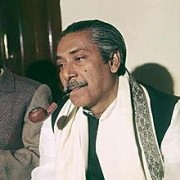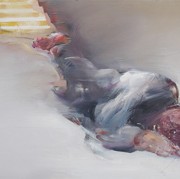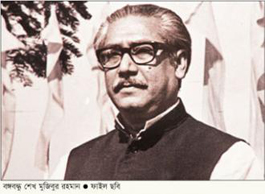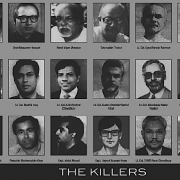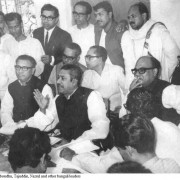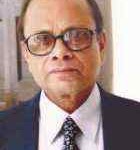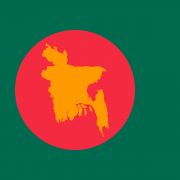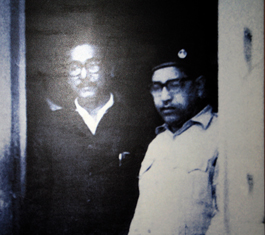The untruths around Bangabandhu
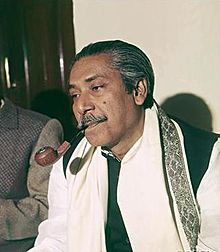 A retired deputy head of the BBC’s Bengali Service last week gave a new twist to Bangladesh’s history through a letter to The Guardian newspaper in London. He was responding to an article by Ian Jack on Bangladesh, which article we will, if we so wish, deal with later. At this point, note what this Bengali gentleman had to say about Bangabandhu’s arrival in London on January 8, 1972 following his release from Pakistani detention by the government of President Zulfikar Ali Bhutto.
A retired deputy head of the BBC’s Bengali Service last week gave a new twist to Bangladesh’s history through a letter to The Guardian newspaper in London. He was responding to an article by Ian Jack on Bangladesh, which article we will, if we so wish, deal with later. At this point, note what this Bengali gentleman had to say about Bangabandhu’s arrival in London on January 8, 1972 following his release from Pakistani detention by the government of President Zulfikar Ali Bhutto.
On his arrival at Heathrow, said this long-time BBC broadcaster, Bangladesh’s founding father was received by Apa Panth, the Indian High Commissioner to the United Kingdom. When Panth addressed Bangabandhu as “His Excellency,” Sheikh Mujibur Rahman appeared surprised. To all intents and purposes, he had thought that he had been freed by the Pakistan government after full regional autonomy had been granted to East Pakistan. He had absolutely no idea, implied the veteran broadcaster, that Bangladesh had become a free country. And that was not all. This journalist also peddled the untruth that he was the first Bengali to meet Bangabandhu once the latter had checked in at London’s Claridge’s Hotel.
That letter in The Guardian is proof once again of the persistence with which Bangabandhu’s detractors –and sometimes his followers — have been trying to undermine his place in history through their imaginary tales and concocted stories. Let the record of Bangabandhu’s arrival in London in January 1972 be set straight.
At Heathrow, the Father of the Nation, accompanied by his constitutional advisor Kamal Hossain and Hossain’s family, was received by John Sutherland, a senior official at Britain’s Foreign Office. Also on hand was the senior-most Bengali diplomat in London at the time, M.M. Rezaul Karim. In his account of the day’s events, Karim, now deceased, left behind a clear narrative that no one has questioned till now.
Bangabandhu hopped into Karim’s car (and Karim himself was at the wheels) rather than take the limousine the British government had placed at his disposal and on the way pelted the diplomat with endless questions about the just-concluded War of Liberation. Crowds of Bengalis began to gather before Claridge’s once word began to get around that Mujib had arrived there. Our veteran journalist happened to be one of many who turned up there.
Hours later, Bangladesh’s leader spoke at a crowded news conference at the hotel on the matter of his imprisonment in Pakistan and the manner of his release by the Bhutto administration. Prior to the news conference, he had spoken to Prime Minister Edward Heath and Opposition Leader Harold Wilson, both of whom motored down to Claridge’s to greet Bangladesh’s founder-president. Bangabandhu had also spoken to Prime Minister Tajuddin Ahmed and his family as well as Indian Prime Minister Indira Gandhi soon after stepping into Claridge’s.
His performance at the news conference was a clear demonstration of his command of the situation. Besides, his meetings with Bhutto between the end of December 1971 and his release on January 8, 1972 were crucial: Mujib was informed by Bhutto of the new realities in the subcontinent, of the fact that there was a government at work in Bangladesh. The Pakistani leader wanted, though, guarantees from Bangabandhu that Bangladesh would maintain some kind of link, even a loose one, with Pakistan. Bangabandhu made no response.
And that is the story of January 1972. But when you seriously reflect on the many ways in which certain individuals have endlessly tried running Bangabandhu down, you cannot but be appalled at the depths to which they have gone to denigrate him. There are yet Bengalis whose sense of history and understanding of Bangabandhu’s political career come across as pitiably poor. They will raise the question of why Bangabandhu “surrendered” to the Pakistan army in March 1971. It is then that you are compelled to remind them that Bangabandhu’s politics had always been based on constitutionalism, that fear was never a part of his character, that he did not have it in him to run for his life.
In this country, we have had men, some of them well-known freedom fighters, who have gone around screaming their refusal to honour Sheikh Mujibur Rahman as Bangabandhu. When they do that, you ask them a couple of questions: If you do not honour Bangabandhu, why did you join a war that was waged in his name? And, more significantly, when an entire nation calls him Bangabandhu, who gave you the right to deny him his place in our consciousness and in our history?
There are then a few others who have sought to profit through alleged association with Bangabandhu. A veteran journalist, now living overseas, penned a book on his dealings with the Father of the Nation more than two decades ago. You would think, as you go through the work, that this newsman was the only individual in Bangladesh to proffer words of wisdom to Bangladesh’s founder.
He informs us, to our disbelief, that in the late hours of the night and buffeted by crises, Bangabandhu would seek his advice, call him and ask him to come over to 32, Dhanmondi. Of course, nothing of the sort happened. There is then the story of another individual (and he too lives abroad) who has tried convincing people that in the heady days of March 1971, he was press secretary to Bangabandhu. He was not. No one recalls him in that position.
Lord, forgive them, for they know not what they do!
Author : Syed Badrul Ahsan / Daily Star
The writer is Editor, Current Affairs, The Daily Star. E-mail: bahsantareq@yahoo.co.uk

